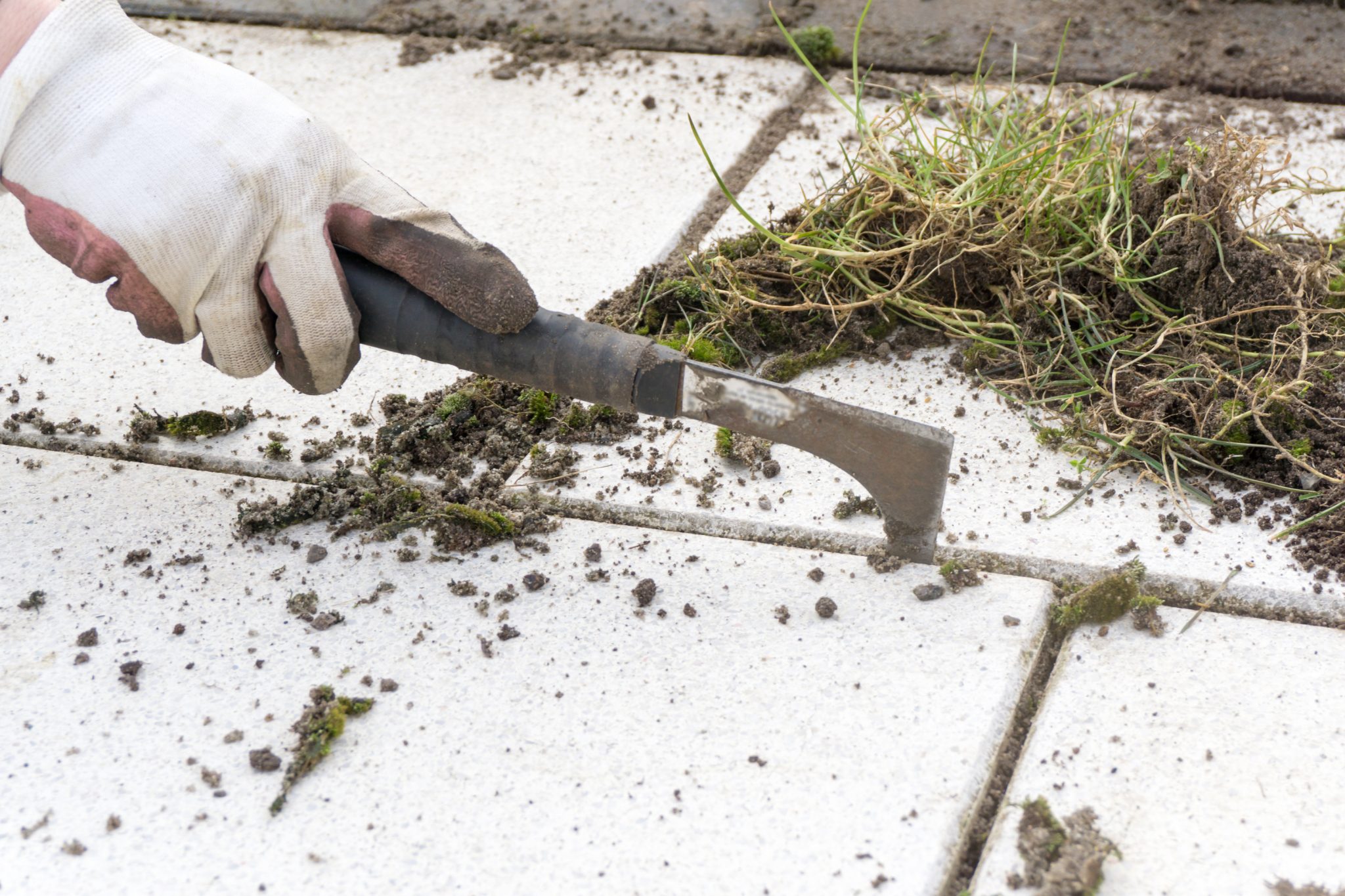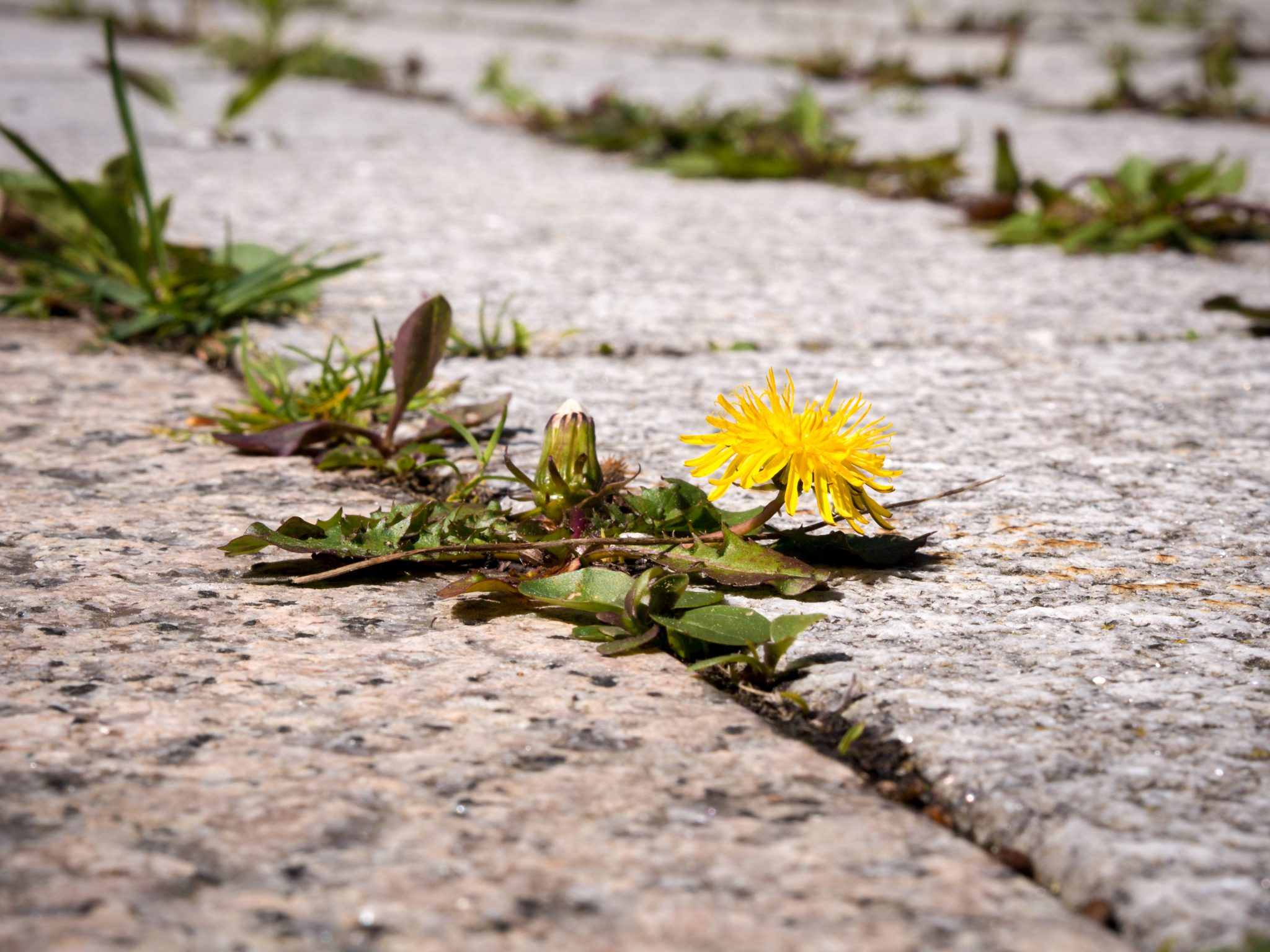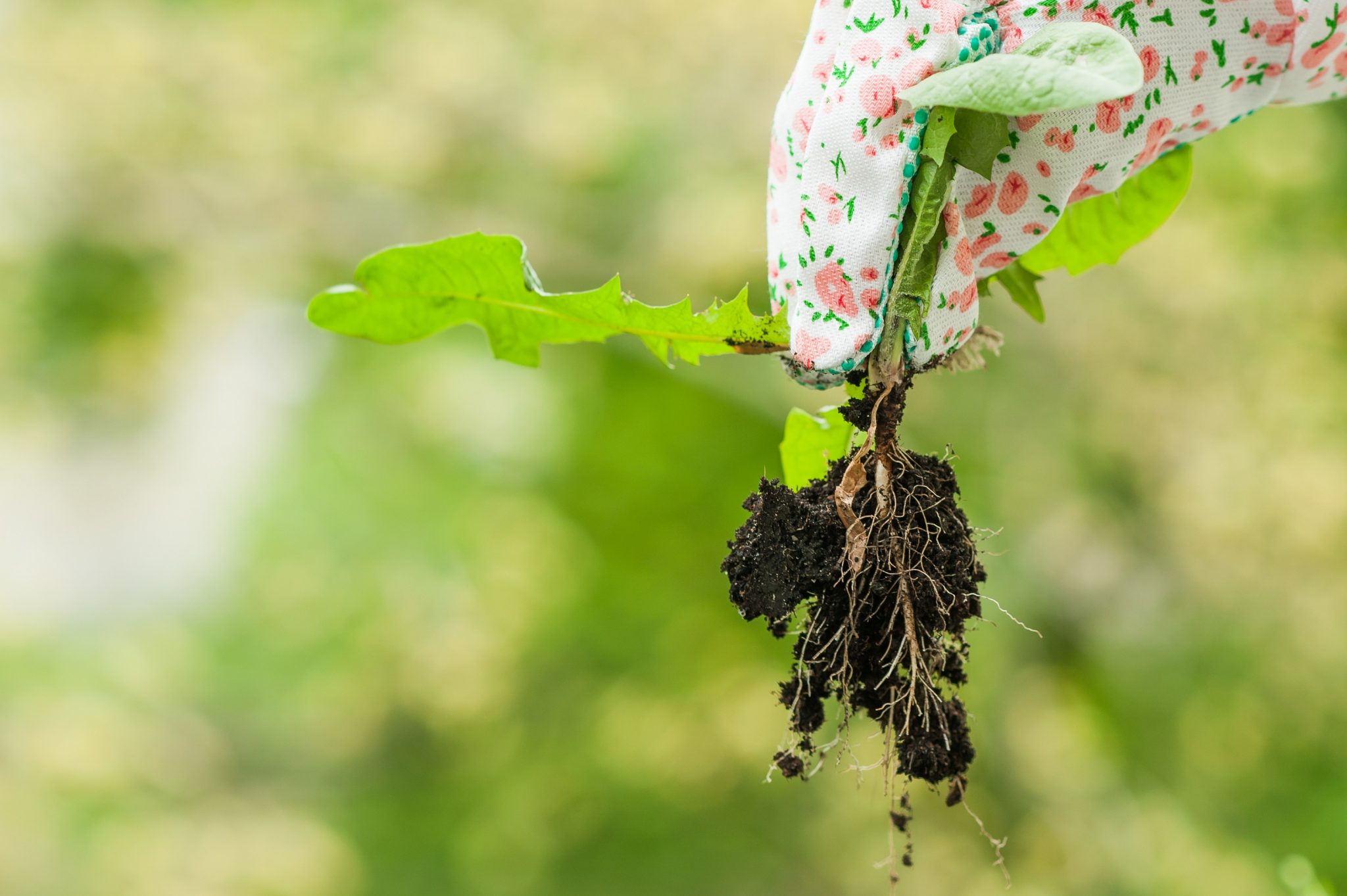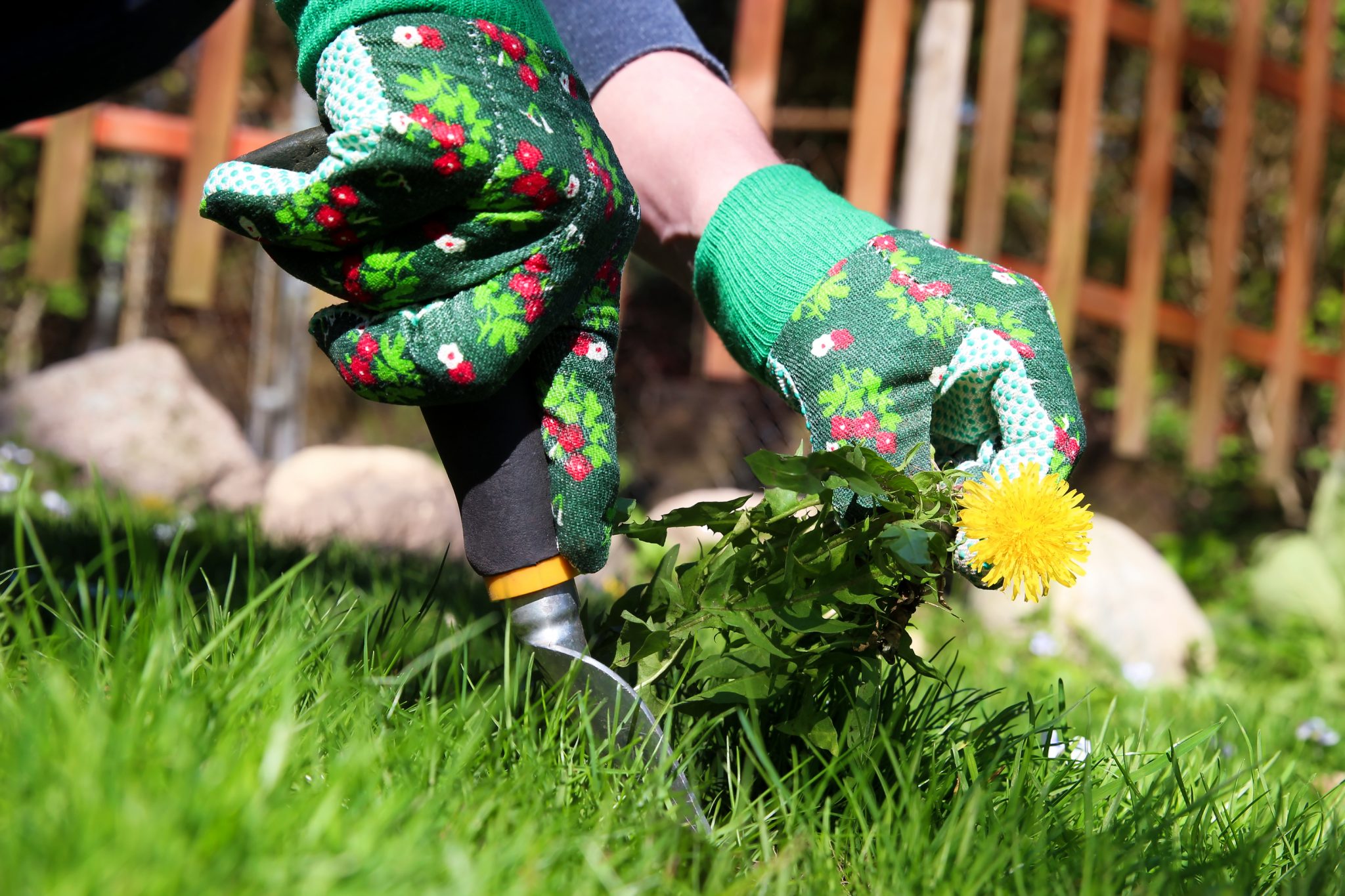17 Natural Ways to Kill Weeds
Almost everyone hates weeds. From avid gardeners to folks who consider any type of yardwork absolute torture, pretty much anyone with a yard can agree on one thing: Weed control is ongoing and the worst way to spend your weekend.
Of course, there are plenty of commercial herbicides that use toxic chemicals (some of which are organic compounds) for long-term weed eradication, but, while these products are generally rather effective, recent studies link one of the most popular, widely available weed killers to cancer. Others have been linked to kidney and liver damage, endocrine disruption, birth defects, and detrimental effects on wildlife and the environment.
If you have not already stopped using products labeled as potential or likely carcinogens, such as glyphosate and 2,4-dichlorophenoxyacetic acid (aka 2,4-D), it may be time to do a little more research on the possible health effects of these weed killers before spraying them around your family and pets. A quick online search for health effects of commercial herbicides will likely turn rather quickly into a search for how to kill weeds naturally.
The good news is that there are lots of natural and homemade weed killers that are both effective and non-toxic. So, if you are tired of pulling weeds, there are plenty of options you can try before turning to potentially dangerous chemicals.
When using natural weed control methods, it is important to remember that weeds are basically just plants that we find undesirable. Natural herbicides kill plants indiscriminately, which means they will kill desirable plants right along with unwanted weeds. Therefore, it is necessary to apply these products with care to kill the weeds you do not want without damaging the plants and flowers you love.

1. Use the hands-on approach: Pull weeds before they go to seed.
Most gardeners search for natural ways to kill weeds specifically because they do not want to pull them. However, this old-fashioned weed-removal method is a tried-and-true way to get a weed-free yard. You should not have to pull weeds on a regular basis, since you are going to use some of these other natural weed control options, but sometimes this is the best way to get rid of weeds fast. Most importantly, you need to get rid of weeds that are starting to go to seed. Once your current weeds go to seed, those seeds are going to scatter throughout your yard and make weed removal much more difficult. So, whether you pull them or kill them by other means, be sure to get rid of your weeds before they go to seed.
2. Bring out the blow torch.
Weed torches are actually a thing, and you can even purchase them online. But, before you get too excited, it is important to note that these backyard blow torches should not actually be used to burn weeds, since any vegetation dry enough to burn is probably not safe to burn. Instead, use your propane weed torch to wilt your weeds into submission. Obviously, you need to keep open flames far from desired plants, trees, your firewood storage area, anywhere with dry vegetation, your house, other structures, and anything flammable. Because of this, it is going to be best for most folks to try other natural weed control methods before turning to a blow torch.
3. Mow them down.
Mowing your weeds will remove their flowering bits, which is a temporary fix to keep your weeds from going to seed. This method is most effective for weeds growing in natural grass lawns and, again, it is only temporary. You will still need to employ other natural weed killers to eradicate the problem, but this quick fix will at least keep the weeds from going to seed and those seeds spreading to create an even bigger issue.
4. Dowse them with boiling water.
This natural weed killer is practically free, and you definitely already have it on hand. All you need is a stove, a pot, and some tap water. Or, better yet, if you happen to have a stovetop tea kettle or an electric kettle, this process will be even easier. All you need to do is boil water, and then pour it directly on unwanted weeds. You may have to do this more than once if you have weeds with deep tap roots, but it will eventually kill them off. Be sure to avoid pouring boiling water on desired plants, since this is an indiscriminate killer.
5. Use your grandmother’s favorite homemade weed killer: vinegar.
Vinegar is one of the best-known natural weed killers and has been used for this purpose for just about as long as people have been trying to rid their yards of weeds. You will be best served by picking up vinegar with 20% acetic acid, which you can purchase online or at your local garden center. The stuff you buy at the grocery store has only 5% acetic acid and is great for cleaning and all sorts of household tasks, but it will not kill weeds as effectively as vinegar with 20% acetic acid. Once you have acquired your vinegar, simply put it in a garden sprayer or spray bottle and spray it directly on the leaves of unwanted plants. This is another indiscriminate killer, so you will need to make sure you do not accidentally spray any on desirable plants. You will likely need to repeat the vinegar treatment two or three times to get the job done.
6. Stop weed seeds from germinating with cornmeal.
If you enjoy spending time in the kitchen, you probably already have cornmeal on hand. This means that you can stop weed growth in your yard with a natural weed killer right from your pantry. Cornmeal stops weed growth by inhibiting germination. Since cornmeal keeps all seeds from germinating, it is important that you use this weed control method only in areas where you are not going to try to grow desired plants from seeds. Cornmeal will not affect established plants, so you can use it on bare ground to keep weed seeds from germinating, or you can use it in flowerbeds or vegetable gardens that have established plants. Just avoid using the cornmeal method in areas where you plan on planting seeds.

7. Brush baking soda into cracks.
If your main issue is weeds growing through cracks in your walkways, patio, or driveway, you may have the solution in your kitchen right now. Grab a box of baking soda, sprinkle it along cracks where weeds grow, then use a broom or deck brush to push it into the cracks. You will need to repeat this process after it rains or if you rinse down your hardscapes, since that will will dilute the baking soda.
8. Sprinkle the weeds and soil with salt.
Table salt is an effective, inexpensive, natural weed killer that will dehydrate unwanted plants and render the soil barren well into the future. That is the thing about salt: It is incredibly effective at killing weeds, but it will also kill any other plants in the area, and nothing will grow in that soil for at least several months. On a small scale, you can use a minimal amount of salt to kill weeds, and then irrigate the area regularly to dilute the salt so that you will, one day, be able to plant there again. However, it is safest to only use this method in areas where you have no future plans for growing anything at all. For example, driveway cracks or walkways made of gravel or wood chips are good candidates for salt-based weed control.
While salt is non-toxic to humans and animals, you will need to take a few precautions with this one. First, you will need to be careful when applying it to hardscapes and be sure to get it only in the cracks, since salt can corrode concrete and concrete pavers. Secondly, it is imperative that you do not use salt in areas where runoff could carry it to flowerbeds, a natural grass lawn, or other areas where you want to keep the soil healthy.
8. Bring on the borax.
A simple borax-water mixture is an inexpensive, homemade weed killer that takes seconds to mix and kills weeds quickly. You only need about five ounces of borax per gallon of water, so if you have a two-gallon sprayer, you would mix in about 10 ounces of borax until it is dissolved. Then, spray the mixture on areas where weeds are growing to kill weeds quickly. If you are treating smaller areas with a spray bottle, you will only need about an ounce to one-and-a-half ounces of borax per quart of water. Be sure to wear gloves and other protective gear to keep the solution off your skin and out of your eyes. This is another one where you will need to be careful to only spray the weeds you want to kill, while avoiding desirable plants or spraying too much borax onto the soil.
9. Using vodka in homemade weed killer.
If you happen to have some extra vodka in your liquor cabinet, you can mix one ounce of vodka with about two cups of water in a spray bottle. Add a couple of drops of natural dish soap to the mix, shake well, and you have a simple, inexpensive home remedy for weeds. Be sure to spray your vodka weed killer directly on the leaves of the weeds in the middle of the day. Since the vodka kills your weeds by making them more vulnerable to dehydration, sun is an essential part of the equation. Choose a sunny day, spray your weeds around noon or in the early afternoon, and watch them wither away.

10. Make a vinegar weed killer at home with dish soap and salt (maybe).
If you do not have any extra vodka lying around, or you simply do not want to part with it, you can also whip up a vinegar weed killer using vinegar, dish soap and salt. You have two options here: You can fill your spray bottle with vinegar and add a few drops of natural dish soap and a pinch of salt, or you can fill your spray bottle with vinegar, add the dish soap and skip the salt. Which one you choose really just depends on your future plans for the area of your yard that is currently covered in weeds. Either of these homemade herbicides will kill the weeds, but if you choose the salt option, it will also most likely make the soil unamenable to growing desirable plants in that area for at least a few months.
11. Buy an organic herbicide.
If you are not up for making your own homemade weed killer or think that commercial solutions may be stronger or better, you can always purchase an organic herbicide at your local garden center or home improvement store. These natural herbicides often contain acetic acid, citric acid, or oils, such as clove oil, orange oil, or cinnamon oil. Much like homemade weed control options, store-bought organic and natural herbicides are non-selective, so they will kill both desirable and undesirable plants. This means that you need to be careful where you are spraying if you choose this option.
12. Seal cracks in sidewalks, patios, and driveways with cement crack fillers.
If you are mostly concerned about weeds growing up through seams or cracks in concrete driveways, walkways, patios, or sidewalks, you may be able to eradicate your weed problem by simply filling in those cracks. This is an inexpensive, simple solution that can be applied with a caulking gun or that comes even easier-to-use, squeezable bottles that allow you to squeeze the cement filler into the seams and cracks. This will smother tiny weeds that are just beginning to grow and help prevent future weeds from making their way up through the cracks. If you have existing weeds, you will need to kill and remove them before applying the cement crack filler.
13. Recycle old newspapers in your garden.
One way to kill weeds naturally is to deprive them of the sunlight they need to grow. If you suspect that there are weed seeds in your flowerbeds or vegetable garden, moisten the ground and apply several pages of the daily news to block the sunlight from reaching the soil. This will inhibit their growth and provide weed control until the paper biodegrades and adds carbon matter to your soil. Of course, this is not the most attractive option, but you can cover the newspaper with mulch to hide the paper and add additional nutrients to your soil as it breaks down.

14. Install landscaping fabric around plants and under hardscapes.
If you are planning to install an artificial grass lawn, paving stone patio, gravel walkway, or brick driveway, it is always a good idea to include weed-blocking landscaping fabric in the installation process. As they say, an ounce of prevention is worth a pound of cure, and adding this one step to hardscape installations can significantly reduce the amount of time you spend pulling weeds later on.
You can also prevent weeds in established flowerbeds and borders by installing landscaping fabric around plants under wood chips or gravel.
15. Protect your soil and block the sunlight with mulch.
Applying a thick layer of mulch around your desirable plants or on larger patches of bare dirt provides two-part weed control that does not require chemical-laden herbicides or hours of pulling weeds. First, the mulch provides a barrier that will help keep weed seeds from reaching the soil to germinate. Secondly, it will block sunlight from those seeds that do reach the soil. It is important that you know the difference between mulch and compost if you choose this method of natural weed control, since compost will provide your weed seeds with even more nutrients and encourage their growth.
16. Crowd them out.
Use ground covers and close plantings to compete with weeds for water, light and nutrients to crowd out undesirable plants. If it is an area where you do not plan on planting anything else, you can even plant a thug, which is a plant that will happily steal all of the light, nutrients and water from any plants around them – desirable or not – and take over the entire area. Thugs easily crowd out other plants and will readily overpower any weeds that dare grow near them.
17. Rent goats for weed control.
Goats are not the ideal solution for every weed situation, but they are a great choice for hillsides, rocky areas, places that are difficult for humans to reach, and large areas that do not have desirable plants. Goats will eat just about anything in their path, so this is not an option for clearing the weeds in your vegetable garden or around your prized petunias, but they are a viable option for spots where you need some serious weed abatement. You do not need to purchase goats to handle your weed situation; you may have a neighbor who will let you borrow some, or you can rent them from companies or goat farmers who provide goats to clients specifically for this purpose.
Source link


ASK QUESTIONS
Sponsored Link
Buy Artificial Grass from Manufacturer Directly at Low Price
High-quality artificial grass for garden, playground, football, field hockey, tennis, putting green, and multi-purpose. Located in China and delivers to the world. Minimal quantity 500m². Click to visit the supplier's official website